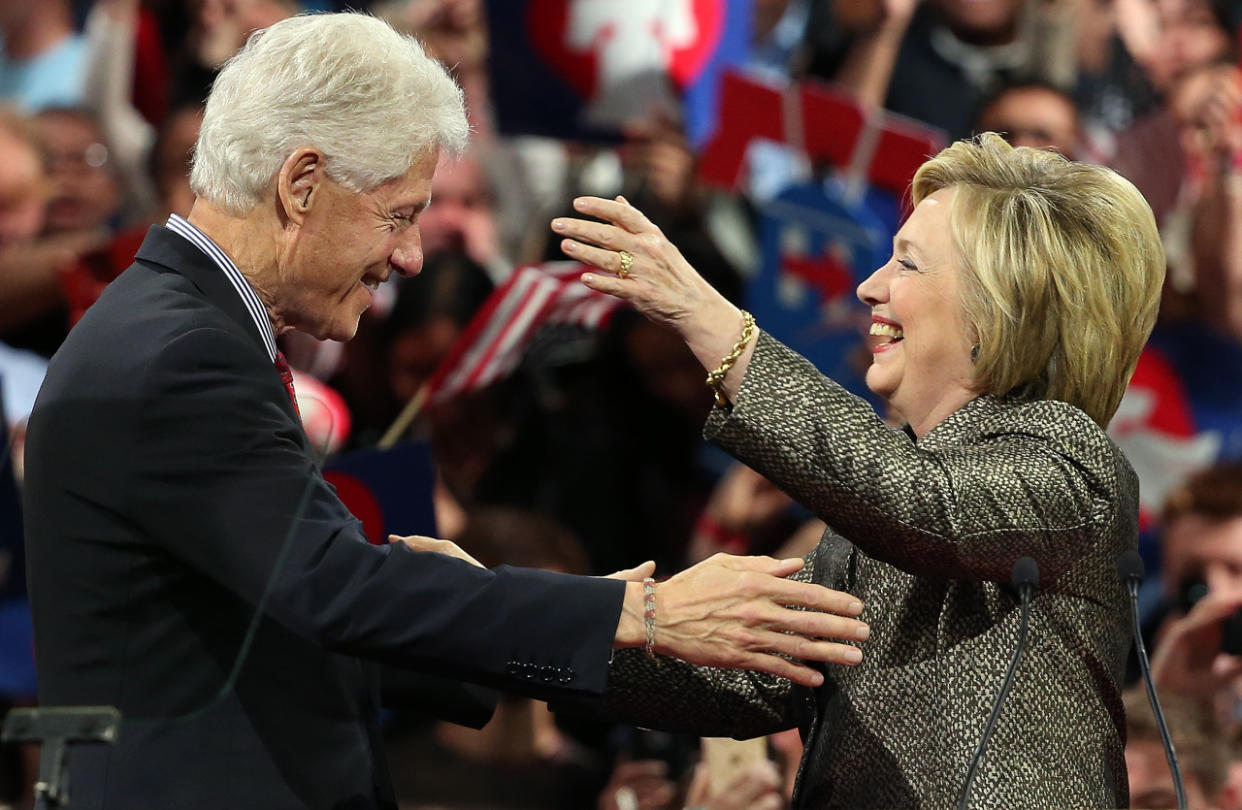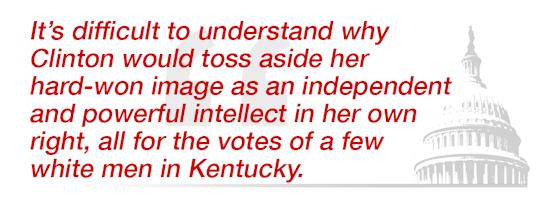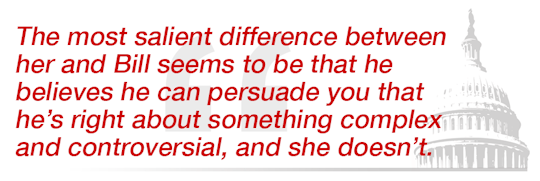The argument Clinton shouldn’t make

Hillary Clinton embraces her husband, Bill, on the night of the Pennsylvania primary. (Photo: Win McNamee/Getty Images)
In case you were wondering what Bill Clinton’s pet cause might be in his wife’s administration — the way recent first spouses have spoken out against addiction, or read books to kids, or gone on TV to promote healthy eating — Hillary spelled it out while campaigning last weekend. Bill, she said, would be in charge of rebuilding the national economy.
Because she’s apparently going to spend her presidency focused on something, you know, more pressing.
In response to the uproar over this comment, Clinton’s campaign fired off an email to reporters detailing all the instances over the last several months when the candidate has made pretty much this same statement. The message being, apparently: If you think this was boneheaded, wait until you see how many other times she said it before you noticed.
I can’t really tell if Clinton’s political instincts are just that bad, or if a few of the people giving her advice should consider other careers, like maybe welding, which Marco Rubio highly recommends. This one statement undermines so much about her campaign, while revealing the absence at the core of it, that it’s truly hard to peel back the layers of inanity.
But it’s a slow week in Washington, so let’s give it a try.
First, let’s just pretend that Bill isn’t Hillary’s husband. Let’s say he is the world’s leading authority on economic revitalization. Let’s assume he can’t walk down the street to buy a smoothie without creating 10 jobs by accident.
Even if all that were true, economic policy isn’t something for which you name a czar, like Ebola or Asian carp. (I’m not making this up — there is actually a czar for that.) It’s kind of a central plank of the presidency. It’s the reason we elect you, more or less.
Maybe Clinton plans to turn over foreign policy to President Obama while she’s at it, and then she can just spend her days as president hunting down all the Republicans and reporters who’ve done her wrong, like that guy in “The Revenant.”

Second, there’s something troubling here on the feminism front. Love Clinton or disdain her, you have to acknowledge that she spent the last 16 years — since she first ran for Senate in New York — doggedly building her own political identity, separate from her husband’s. No one who’s serious about politics now describes her as unqualified for the office.
She’s readying to run a campaign aimed squarely at women, on the theory that Donald Trump reminds most female voters of the high school gym teacher who creeped them out. “I’m with her” is a slogan meant to underscore Clinton’s historic, barrier-breaking significance, which is real.
So it’s difficult to understand why Clinton would toss aside that hard-won image as an independent and powerful intellect in her own right, all for the votes of a few white men in Kentucky.
It’s one thing for Obama to deputize Bill Clinton as his economic salesman and let him go out there and steal the show, as he did at the 2012 convention. But the unfortunate truth is that it’s different for a woman, and it’s different for a wife. If Hillary wants to keep inspiring the little girls of this country, she probably shouldn’t go around saying she’ll turn over the big stuff to her husband.
Third, there’s the problem of ideological confusion. Clinton has spent the past year trying to ride out the populist tsunami in her own party, in part by distancing herself from Bill’s more discredited policies.
So is she now saying that all of that was just a feint, and her convictions around the economy are actually indistinguishable from Bill’s? And if that’s true, didn’t she owe it to primary voters to make that clear from the start?
But OK, let’s leave all that aside. Because the larger problem with Clinton’s statement is that it exposes what’s really missing from her campaign — the vulnerability she’s left herself, even against a candidate as flawed as Trump.
When Bill Clinton first ran for president in 1992, on a platform forged by the upstart Democratic Leadership Council, he took some stands that were toxic in some quarters of his party — for welfare reform, for free trade, for smaller government. He did this, in part, because he wanted to define himself as a different kind of Democrat, but also because he intended to govern like one.
Hillary’s focused on raising American incomes, and she’s right. But her plan comprises mostly safe generalities that have been circulating in Democratic politics for decades: investments in infrastructure, raising the minimum wage, “making the wealthy pay their fair share.” Her rationale is competence.
She could have thought bigger. Al From, who created the DLC and worked closely in those days with Bill Clinton, reminded me recently of some of the interesting ideas he’s publicly championed in recent months. One is the elimination of the regressive payroll tax (or what he calls “the tax on work”), which he’d replace with taxes on polluters or some other combination of revenue streams. Another is the taxing of all income — earned or unearned — at the same rates.

From describes these policies as pillars of a larger argument, which is that work in America isn’t rewarded in the new economy as it was in the old.
Had Clinton latched on to this or some other bolder framework, she could have seized the debate. Sure, Bernie Sanders would have attacked her (unfairly) for endangering entitlements or whatever else, but at least she’d have spent these many months arguing about her audacity and not his.
She hasn’t, and that’s probably not just because she thinks in more technocratic terms than her husband (although she does). It’s also because she doesn’t think she’ll win the argument. The most salient difference between her and Bill seems to be that he believes he can persuade you that he’s right about something complex and controversial, and she doesn’t.
A decade of governing in Arkansas taught Bill that he was a better explainer than his opponents, and he could usually prevail. Hillary’s experience has taught her that critics will distort whatever she proposes, and it’s safer to avoid giving them ammunition.
He always said campaigns were about ideas. She thinks campaigns are about eschewing the kind of big ideas that can be used to destroy you. Thus does she find herself presenting her husband as the boldest economic theory she has.
Clinton’s advisers should caution her to give that one up. Because the bottom line is this: However admired a politician Bill may be, Americans don’t elect presidents with the expectation that their spouses will do the governing.
She of all people should understand that.



